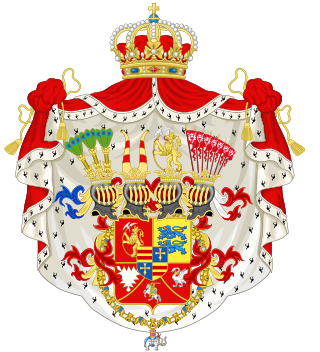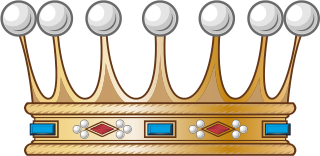
Satire is a genre of the visual, literary, and performing arts, usually in the form of fiction and less frequently non-fiction, in which vices, follies, abuses, and shortcomings are held up to ridicule, often with the intent of exposing or shaming the perceived flaws of individuals, corporations, government, or society itself into improvement. Although satire is usually meant to be humorous, its greater purpose is often constructive social criticism, using wit to draw attention to both particular and wider issues in society.

Count is a historical title of nobility in certain European countries, varying in relative status, generally of middling rank in the hierarchy of nobility. Especially in earlier medieval periods the term often implied not only a certain status, but also that the count had specific responsibilities or offices. The etymologically related English term "county" denoted the territories associated with some countships, but not all.
This article lists notable literary events and publications in 1599.

The House of Schleswig-Holstein-Sonderburg-Glücksburg, also known by its short name as the House of Glücksburg, is the senior surviving branch of the German House of Oldenburg, one of Europe's oldest royal houses. Oldenburg house members have reigned at various times in Denmark, Norway, Sweden, Iceland, Greece, several northern German states, Russia and the United Kingdom. It takes its name from the family seat in Glücksburg, a small town in Schleswig-Holstein, Germany.

Freiherr, Freifrau and Freiin are designations used as titles of nobility in the German-speaking areas of the Holy Roman Empire and in its various successor states, including Austria, Prussia, Bavaria, Liechtenstein, Luxembourg, etc. Traditionally, it denotes the titled rank within the nobility above Ritter (knight) and Edler and below Graf. The title superseded the earlier medieval form, Edelherr.

John Marston was an English playwright, poet and satirist during the late Elizabethan and early Jacobean periods. His career as a writer lasted only a decade. His work is remembered for its energetic and often obscure style, its contributions to the development of a distinctively Jacobean style in poetry, and its idiosyncratic vocabulary.

Sir John Oldcastle is an Elizabethan play about John Oldcastle, a controversial 14th-/15th-century rebel and Lollard who was seen by some of Shakespeare's contemporaries as a proto-Protestant martyr.

Barony Rosendal is a historic estate and manor house situated in Kvinnherad in Hordaland county, Norway. The barony was built in the 17th century by Danish noblemen on the old estate of the Norwegian noble Galte family, the current barony estate making out the historical farms of Hatteberg, Mel and Eik.
The aristocracy of Norway is the modern and medieval aristocracy in Norway. Additionally, there have been economical, political, and military elites that—relating to the main lines of Norway's history—are generally accepted as nominal predecessors of the aforementioned. Since the 16th century, modern aristocracy is known as nobility.

Denis Ivanovich Fonvizin was a playwright and writer of the Russian Enlightenment, one of the founders of literary comedy in Russia. His main works are two satirical comedies—including Young ignoramus, which mocks contemporary Russian gentry—and are still staged today.

Marsvinsholm Castle is situated in Ystad Municipality, Scania, in southern Sweden, 12 kilometres (7.5 mi) from Ystad.

Danish nobility is a social class and a former estate in the Kingdom of Denmark. The nobility has official recognition in Denmark, a monarchy. Its legal privileges were abolished with the constitution of 1849. Some of the families still own and reside in castles or country houses. A minority of nobles still belong to the elite, and they are as such present at royal events where they hold court posts, are guests, or are objects of media coverage, for example Kanal 4's TV-hostess Caroline Fleming née Baroness Iuel-Brockdorff. Some of them own and manage companies or have leading positions within business, banking, diplomacy and NGOs.

Jeppe på bjerget is a 1981 Danish film directed by Kaspar Rostrup. The script, written by Henning Bahs, was based on a play of the same name by Ludvig Holberg.

Prince Erik, Count of Rosenborg was a Danish royal family member. He was born at Copenhagen, the 3rd son of Prince Valdemar of Denmark and Princess Marie of Orléans.

Skarhults Castle is a castle in Eslöv Municipality, Scania, in southern Sweden.

Princess Caroline of Nassau-Usingen was the elder daughter of Karl Wilhelm, Prince of Nassau-Usingen, and wife of Landgrave Frederick of Hesse-Kassel.

Christian Ditlev, Count of Reventlow was a Danish Privy Councillor, nobleman and a landowner.

Klown is a 2010 Danish comedy film directed by Mikkel Nørgaard, and written by and starring Frank Hvam and Casper Christensen. It was developed from the successful Danish television series of the same name, in which Hvam and Christensen play fictionalized versions of themselves.

Christiansholm is a historic house in Klampenborg, Gentofte Municipality, some 10 km north of central Copenhagen, Denmark. It was built by the merchant Just Fabritius and is now owned by the businessman Fritz Schur.

King in Shadow is a 1957 Western German historical drama film directed by Harald Braun and starring O. W. Fischer, Odile Versois and Horst Buchholz. It was shot at the Bavaria Studios in Munich and on location in Hesse and Copenhagen. The film's sets were designed by the art director Walter Haag. The story had previously been portrayed in the 1935 British film The Dictator.

















